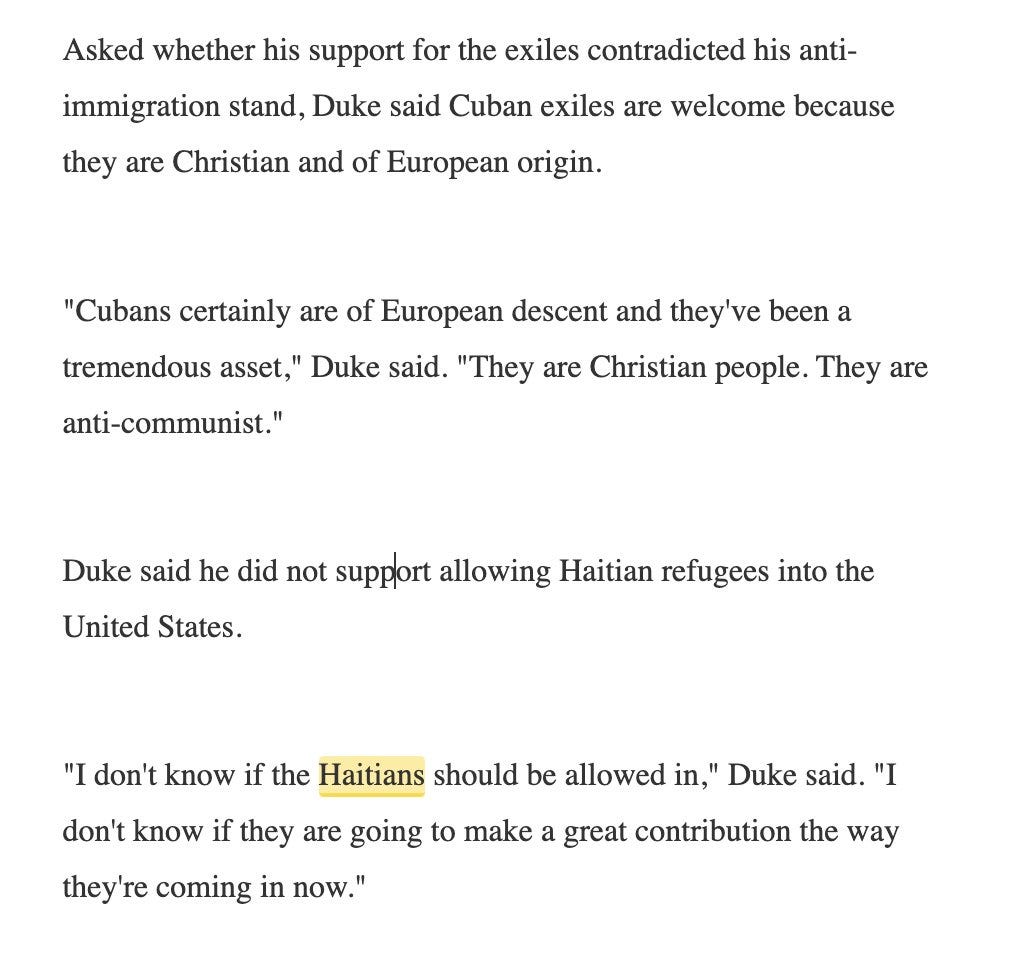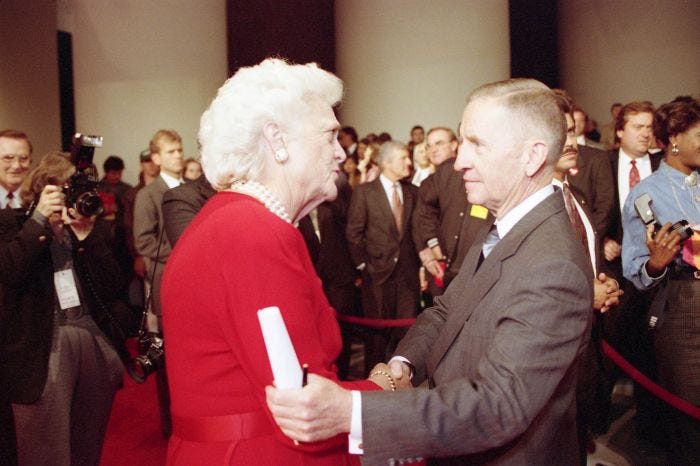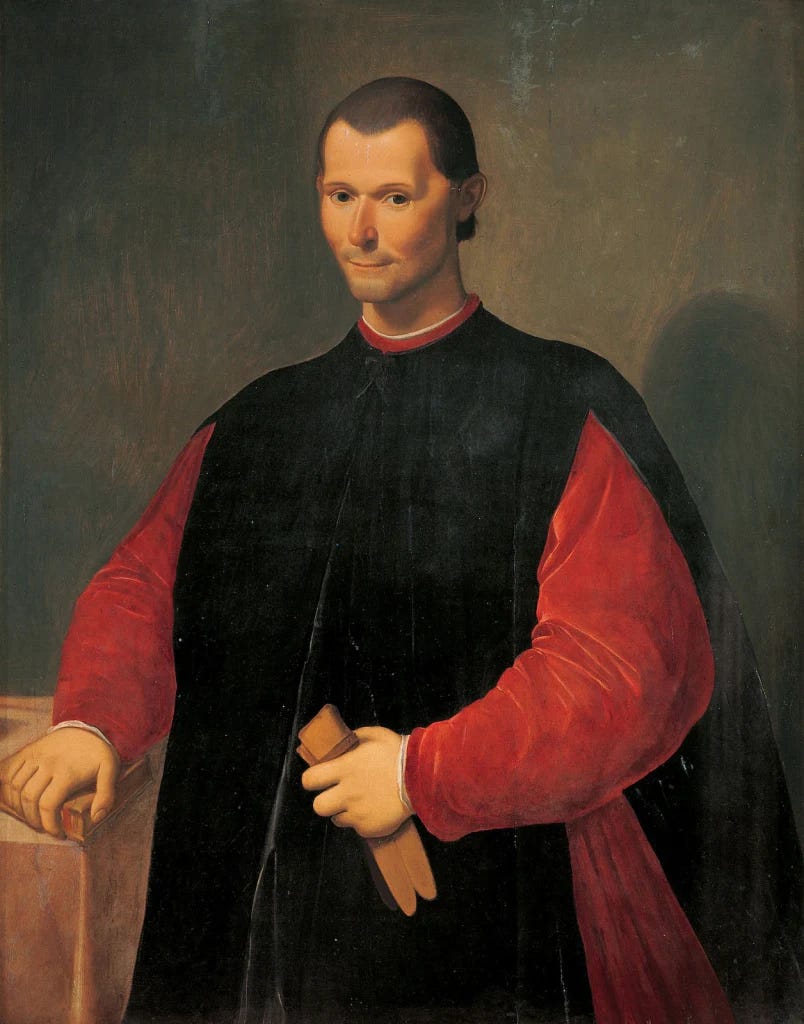A lot of where we are politically at this moment can be traced back to the trajectory of the early 1990s. I’ve been reading “When The Clock Broke” by John Ganz, an excellent history of how the early 1990s presaged the rise of Trump. The Revolutions of 1989 led inexorably to the Fall of Communism. And the resulting 90s were when and where the far right virus metastasized into our body politic. Communism’s end signaled, with a tragic finality, the post-war conservative unity of purpose. The peaceful coexistence that held fast the neocons and the paleocons, the traditionalists and the bigots in common cause, altogether collapsed. This, in turn, led to the crack-up of the Republican Party as we know it, with those reverberations still echoing throughout our politics.
In 1992, Ross Perot became the first (real) billionaire to run for President, announcing his candidacy, curiously enough, on Larry King Live. Does a populist Presidential run by a vastly wealthy man using the medium of television sound remotely familiar? Perot ultimately garnered 19% of the popular vote, the highest amount any third-party candidate had received since 1912. But more importantly, Perot set the stage for Trump’s own successful presidential run almost a two and a half decades later.
A major aspect of the fall of Perot was the withering media gaze he encountered, back when the media actually had that kind of power and influence. A major reason for the rise of Trump is that it coincided with the decay of the traditional media gatekeepers. In fact, heckling the press became a staple of his 2016 campaign rallies. But in 1992, when things were a bit more innocent, Trump was still at the periphery of American history, a minor player in the changing American political landscape, more famous for his bankruptcies and his extracurricular sex life than for his immigration policy. In 1992 a Duke-like politician could not win statewide office. What a difference a few decades would make!
Historians of the future may regard the Bush family with their various idiotic Middle East and Central Asian wars as the proximate cause of the conservative crack-up of the Republican party. David Klion of The Nation, reviewing Ganz’s book, writes:
It was the first President Bush’s misfortune, even as he claimed victory over Saddam Hussein and his approval rating soared, that the bills came due on his watch: The savings-and-loan sector collapsed in scandal, banks failed, oil prices surged, crack and homelessness flooded dilapidated inner cities, military bases closed, factory jobs moved abroad, and Brooklyn and Los Angeles exploded in race riots. The tech boom that would buoy Wall Street through the next few decades hadn’t fully begun, and the national mood was one of omnidirectional rage. It was an ideal environment for demagogues.
Perot ran again in 1996 and actually did worse, essentially ending his political career. Though he spent a small fortune with each of those quixotic runs, he would presage an era of the populist, anti-internationalist tariff money-guy. It is, in retrospect, impossible not to see the elements of Perot’s 1992 campaign — disaffected white non-college graduates, the leveraging of free television, the stalwart opposition to free trade — and Trump, 2016, a campaign which also involved a contest against a Clinton.
If Trump’s 2016 campaign conjures Perot’s in 1992, then Senator JD Vance’s debate performance earlier this week reminded me most of the 1991 Louisiana gubernatorial election, also covered in Ganz’s book. In tone and in presentation, Vance’s slickness most resembled not so much a Federalist Society debate at Yale (as the pundits liked to opine) as David Duke on Larry King in 1991. Or even David Duke on Nightline during that same time frame.
Duke, like Vance, is an accomplished liar, who had a lot of experience doing adversarial debates in the run up to political office. “The good thing with JD is that he’s done so much media that he’s been hit with oppo and defended himself so much,” a source told NOTUS. “He does multiple interviews a week where he’s being hit with tough questions. JD is fully comfortable answering the attacks on himself and has experience doing it, whereas Walz does not.”
And it showed. While Walz projected Minnesota nice and political competence, Vance was a Rottweiler unencumbered by facts. How else does one claim with a straight face that Trump — the greatest existential threat to ObamaCare — was its savior? Vance came across as faster, smoother and smarter than Walz, significantly absent in the proceedings, however, was his moral center. “He came across more confident — and marshaled data points more smoothly — than Walz, who conveyed a lack of confidence from the beginning and looked worried,” is how Chait saw it. Chait, however, is only (as always) part right. Hyper-competitive achievers like Chait — and Vance, to be sure — tend to miss altogether virtues that much of America hold dear, like likeability and straightforwardness.
Vance cares little about those qualities, despite extolling them rhetorically when elections near. It is one of many qualities he shares with David Duke, who was so smooth in debate that butter would not melt in his mouth. In 1992 Duke, who had been debating since his days taking to the soapbox at Free Speech Alley at Louisiana State University, became a mainstay on national television. There he improved, in debates against Ted Koppell and Phil Donahue, at refining his racist message. On book tours for Hillbilly Elegy and in campaigns for the US Senate, Vance became very effective at shaping the conversation, steering it where he wanted it to go. Further, as Trump’s Rottweiller, Vance is willing to go places and do things in public that Trump as the principle cannot do. “Vance pre-recorded an interview with Tucker Carlson on Thursday just hours after the White House criticized the right-wing populist for featuring a historian who suggested, a few days before, that the Holocaust happened by accident,” Mark A. Caputo wrote on The Bullwark.
All is not lost, however. A Jonathan Chait can admire. albeit haltingly, “slick” and “smooth salesmanship,” even as a good portion of America prefers Target dad decency, which showed in Walz’s favor in this week’s debate. A Washington Post-ABC News-Ipsos poll found that after the debate, 32% of Americans have a favorable impression of Vance and 42 percent found him unfavorable, a net favorability rating of -10 points. The same poll found that after the debate, Walz had a 39% favorability rating with 30% unfavorable, or, a net positive rating of nine points. So there’s that …

When Waltz attacked Vance for his spurious, racist lies that Haitian immigrants have been feasting on the beloved pets of Midwesterners (incidentally: how specific is that focus-tested nugget?), Vance’s reply came straight out of the David Duke playbook: “The people I care most about in Springfield are the American citizens.” It is a spectacularly disingenuous statement, deflecting the potentially damaging question towards a patriotic outcome. It’s not that he hates Haitians, its that he loves America! Cue: Lee Greenwood. And it worked, to a degree. It’s precisely how David Duke used to play the game of politics, signaling to those who knew, while not unnecessarily alienating the possible converts. Vance was quite effective at pivoting away from the questions of the moderators to the answers he wanted to give, which probably did not help his campaign in terms of their suburban women problem. But neither Trump nor Vance could really give a damn.
David Duke, in the 90s, was also a master of the pivot. With his even, reasonable tone, he argued batshit things like “the Jews control Hollywood.” Similarly, on the campaign trail, Vance argued first that Haitians are eating Fido and Ms. Sassy, then, when exposed, said he did it all to start a conversation about illegal immigration because the Democrats simply wouldn’t. Members of the far right in When The Clock Broke are depicted as more pessimistic, more cynically Machiavellian and modernists; Conservatives, on the other side of the GOP crack-up, were depicted as in the classical political philosophy mode …
The Machiavellians were more inclined to see the world through the prism of being in a Hobbesian state of Nature, with all races in an existential competition against one another for resources. This conveniently supplies an intellectual underpinning to their racism, to their default state of hatred. Both Duke and Vance fall into this category on the Right, in the inglorious tradition of dedicated paleo-bigots like Samuel Francis and the late far-right Classicist Revilo Oliver. And on Duke’s ability to game the system with a half smile, rhetorically introducing white supremacist ideas into the national conversation, Ganz wrote for The Guardian:
On TV he could avoid the two great enemies of demagogues: context and memory. If questioned too sharply, he could just play the victim. Here was this nice-looking, clean-cut guy being badgered by some snooty journalist. He always got his message across, one way or another: “I just think white people should have equal rights, too.” Now what was so unreasonable sounding about that? He could also just flat-out lie. He told a weekend anchor on a network affiliate in New Orleans that he had polled 8-12% of the Black vote in Louisiana – he was not pressed on it.
“Take it from someone who has spent most of his adult life working in this medium,” Ted Koppel lectured sternly into the camera at the start of ABC’s Nightline. “Television and Duke were made for each other.” Then Nightline proceeded to give him 30 minutes of free airtime. Duke did Larry King Live and The Phil Donahue Show in ’91. Phil Donahue and his audience yucked it up to Duke’s jokes. The Times-Picayune called his Larry King appearance “a solid hour of largely uninterrupted propaganda and uncontradicted lies”.
Samuel Francis, who died in 2005, would have admired JD Vance, recognizing him as a fellow traveler on the Machiavellian side of the Republican crack-up, in the tradition of people like Pat Buchanan and Charles Coughlin. What is a more noble lie than a lie in defense of your race’s right to more natural resources? It is an American tradition as old as AM radio and white aggrievement. But it was Vance’s damning non-answer as to whether or not Trump lost the 2020 election that conjured, at least to my mind, not the polished rhetoric of a Yale Political Union collegiate debate so much as David Duke’s Machiavellian talk show tour of 1992, providing a slick exterior to a hateful and rotten core.
“Former President Donald Trump was ‘fundamentally’ acting as a private candidate for office and not as president of the United States when he sought to overturn his 2020 election loss, special counsel Jack Smith’s team argued in a filing Wednesday that revealed new details of the scheme at the heart of Trump’s federal election interference case. The filing asserts that Trump knew that the claims he was spreading about the 2020 election were lies, with Smith's team arguing that Trump didn't believe his own falsehoods but instead spread them as part of his broader scheme to stay in power.” (NBCNews)
“A few weeks back, I spoke to a group of graduate students at the City University of New York’s Newmark School of Journalism. I tried to impress upon them two takeaways. The first is that mainstream journalism’s rigid genre conventions—granting equal weight to ‘both sides,’ passing on what both say without ‘editorializing’ as to the truth value of the claim, let alone explaining how one side intentionally and skillfully exploits those norms to direct more attention to the lie than to the truth—may have evolved with the intent of delivering maximal fairness and accuracy. But in the here and now, they utterly fail to convey reality. I invited them to imagine themselves as historians 75 years hence, reading, say, front-page articles from The New York Times in 2016. They might conclude that Hillary Clinton was equally as corrupt as Donald Trump, or even more corrupt. Reading newspapers from 2022, they’d suspect that Americans were suffering Weimar-like inflation. Or from this year, when they’d suspect an explosion of violent crime, when crime actually is down. Or they might conclude that in October of 2024, Kamala Harris lost favor among millions of undecided voters because, after ‘promising to crack down on supposed price gouging by supermarkets … she skipped over the issue preoccupying millions of Americans in her Tuesday interview in Philadelphia and pivoted to another message.’ Then, digging deep into the sources, they may argue that the picture newspapers conveyed was about as accurate as that served to Soviet citizens by the state newspaper Pravda. My second point to the students is that journalistic norms are not a suicide pact. If the authoritarians in control of the Republican Party achieve enough power, they will start methodically knocking off liberal institutions, including politically independent journalism. I told them that I do not envy them, because their generation of journalists faces the staggering burden of reconceptualizing their profession’s inherited rules for delivering fairness and accuracy.” (Rick Perlstein/TAP)






